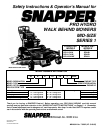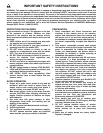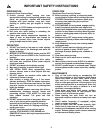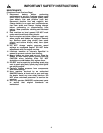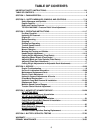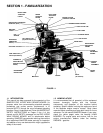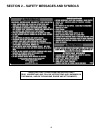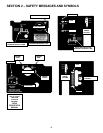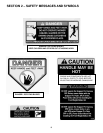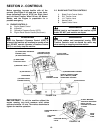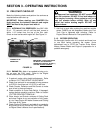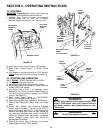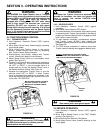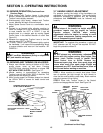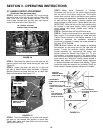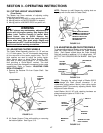
3
IMPORTANT SAFETY INSTRUCTIONS
PREPARATION
(Continued From Previous Page)
11. Protect yourself when mowing and wear
appropriate clothing including safety glasses, long
pants, ear protection, hardhat and substantial
footwear with good traction. Long hair, loose
clothing or jewelry may get tangled in moving
parts.
12. Know how to STOP blades and engine quickly in
preparation for emergencies.
13. Use extra care when loading or unloading the
machine into a trailer or truck.
14. Check grass catcher components frequently for
signs of wear or deterioration and replace as
needed to prevent injury from thrown objects
going through weak or worn spots.
OPERATION
1. DO NOT put hands or feet near or under rotating
parts. Keep clear of the discharge area while the
engine is running.
2. BEFORE STARTING ENGINE, blades must be OFF
and Traction Levers LOCKED in the Traction Lock
position.
3. Stop Blades when crossing gravel drive, walks,
and under any conditions where thrown objects
might be a hazard.
4. DO NOT raise deck with the blades running.
5. Mow only in daylight or good artificial light.
6. USE EXTRA CARE when approaching blind
corners, shrubs, trees or other objects that may
obscure vision.
7. DO NOT operate the machine while under the
influence of alcohol or drugs.
8. After striking a foreign object or if the mower
vibrates abnormally, STOP the blades and engine.
Remove the key. Disconnect and secure the spark
plug wire. Inspect the mower for any damage and
repair the damage.
9. DO NOT operate machine near drop offs, ditches,
embankments, washouts culverts, fences and
protruding objects. STAY ALERT for holes and
other hidden hazards. Tall grass can hide
obstacles.
10. DO NOT operate machine on wet grass. Always be
sure of your footing while operating machine,
especially while backing up. Keep a firm grip on
the handle. Walk: never run. Slipping and falling
could cause injury.
11. DO NOT leave the machine with the engine
running. STOP BLADES, STOP ENGINE and
REMOVE KEY before leaving the operator position
for any reason.
OPERATION
(Continued From Previous Column)
12. Before cleaning, repairing, or inspecting make
certain blades, engine and all moving parts have
STOPPED. Remove key and secure spark plug
wire away from spark plug key to prevent
accidental starting.
13. STOP MACHINE on level ground, engage parking
brake (if equipped) and make sure engine and
blades have stopped before leaving the operator’s
position for any reason including removing grass
catcher or unclogging mower to prevent injury to
hands or feet.
14. Blades must be OFF except when cutting grass.
Set blades in highest position when mowing over
rough ground.
15. Keep hands and feet away from rotating blades
underneath deck.
16. DO NOT operate machine without entire grass
catcher or guards in place. DO NOT point
discharge at people, passing cars, windows or
doors.
17. Slow down before turning.
18. Watch out for traffic when near or crossing
roadways.
19. Move motion control levers SLOWLY to maintain
control during speed and directional changes.
20. DO NOT operate engine in enclosed areas. Engine
exhaust gases contain carbon monoxide, a deadly
poison.
MAINTENANCE
1. Shut off fuel while storing or transporting. DO
NOT store machine or fuel container inside where
fumes may reach an open flame, spark or pilot
light such as in a water heater, furnace, clothes
dryer or other gas appliance. Allow engine to cool
before storing machine in an enclosure. Store fuel
container out of the reach of children in a well
ventilated, unoccupied building.
2. Clean grass and debris from engine, mufflers,
drives and cutting units to help prevent fires.
Clean up fuel, oil and excess grease.
3. When draining fuel tank, drain fuel into an
approved container outdoors and away from open
flame.
4. Check brakes frequently (if equipped); adjust,
repair or replace as needed.
5. Keep all bolts, nuts and screws properly tight.
Check that all cotter pins are in proper position.
6. Always provide adequate ventilation when running
engine. Exhaust gases contain carbon monoxide,
an odorless and deadly poison.



